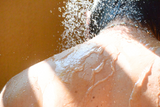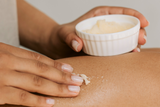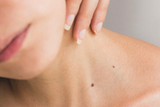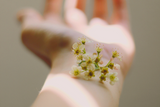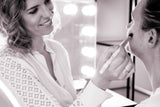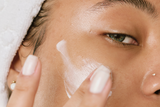Easy Peasy You
Maskne: With these 10 tips you can avoid pimples through the mouth-nose mask
Posted by Lara Schimweg on
Preventing maskne: Reduce skincare and makeup under the mask
Use gentle skincare products
Shift your skincare routine to the evening.
Updated on December 15, 2023
If you care about yourself and your health, FFP2 masks are still sometimes a topic of discussion. While mask mandates have been lifted, that doesn't mean you should stop wearing a mask in everyday life. FFP2 masks, or any surgical mask, can be quite irritating to the skin and lead to perioral dermatitis . This condition is also known as "maskne." A moist environment develops under the mask, as you breathe in and out regularly.
First off: acne or not, masks sometimes make sense because they protect us and others from COVID-19 and other illnesses. Even if masks are currently causing skin problems or simply annoying, they are important for all of us. We shouldn't forget that.
What is Maskne?
Perhaps you've already noticed that wearing a mask can make your skin more prone to problems, often resulting in breakouts—a condition known as maskne. The medical term is perioral dermatitis, also called stewardess disease or perioral dermatitis. It typically appears on the chin, around the nose, and on the cheeks. You might already have issues in these areas. Masks are particularly irritating to sensitive skin, skin prone to rosacea , and skin that is easily inflamed and prone to blemishes. This can quickly lead to the development of maskne.
Causes of maskne
Especially for sensitive skin, the moist environment isn't ideal. Underneath the mask, a kind of enclosed space is created where bacteria and fungi can thrive. It's also a perfect breeding ground for acne-causing Propionibacterium. It feels particularly comfortable and multiplies easily in such an environment. That's obviously not good for you. Unfortunately, the skin also becomes even oilier when under such a mask. This is also detrimental if you're already prone to breakouts. And as if that weren't enough: your skin heats up under the mask and sweats to cool down. This is especially problematic for people with rosacea. The heat under the mask causes the blood vessels in the skin to dilate, resulting in redness. This, in turn, exacerbates inflammation. So you see: regardless of skin type or specific issue, masks aren't exactly comfortable for anyone.
Here's what you can do to prevent maskne
How can you soothe your skin, prevent inflammation, and reduce redness, pimples, and pustules?
Here's a short, helpful list to help you prevent and reduce maskne:
1. Change your mask regularly
Change your mask regularly, at least once a day, preferably more often. This prevents a breeding ground for fungi and bacteria that can lead to maskne.
2. Remove the mask occasionally.
Wear your face mask only as much as necessary (but definitely always when other people are nearby).
3. Gentle cleansing for maskne
Cleanse your skin in the morning with lukewarm water only. If necessary, you can use a mild cleanser . Your skin is very sensitive right now, so you shouldn't cleanse it too often or irritate it too much. In the evening, you should definitely cleanse your face with a mild cleanser to remove sweat and dirt.
← Older Post Newer Post →
0 comments



